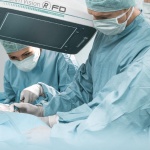
Article • Increase confidence in the operating theatre
Adapting to image guided surgery
In more than 21% of complex anatomical osteosynthesis procedures, an intraoperative improvement of the implant position or a revision of reduction has to be performed (Recum von, J. et al., Unfallchirurg 2012, 115:196-201, Die intraoperative 3D-C-Bogen-Anwendung. State of the art).

























